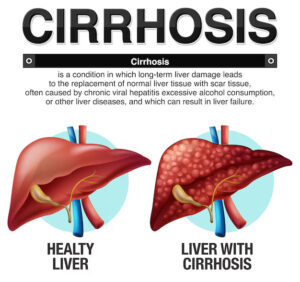
Introduction
Liver cirrhosis is a serious condition where the liver becomes scarred due to long-term damage. This can happen because of chronic liver diseases like hepatitis, excessive alcohol use, or fatty liver disease. If not treated on time, cirrhosis can lead to liver failure, which is life-threatening. But the good news is that early diagnosis and proper treatment can help slow its progression and improve liver health.
In this article, we’ll discuss the most effective solutions for liver cirrhosis, including lifestyle changes, medical treatments, and advanced therapies recommended by the best gastroenterologist in Surat.
Understanding Liver Cirrhosis
Cirrhosis develops when healthy liver cells are gradually replaced by scar tissue. This scarring makes it difficult for the liver to function properly. Some common causes include:
- Hepatitis B & C: Chronic viral infections can damage liver cells over time.
- Fatty Liver Disease: Excess fat accumulation in the liver leads to inflammation and scarring.
- Alcohol Abuse: Heavy drinking over many years damages liver tissue.
- Genetic Conditions: Diseases like Wilson’s disease can affect liver function.
- Autoimmune Diseases: The body’s immune system mistakenly attacks liver cells.
If you experience fatigue, loss of appetite, jaundice (yellowing of the skin), swelling in the legs, or unexplained weight loss, you should consult a liver specialist immediately.
Effective Solutions for Liver Cirrhosis
While cirrhosis is irreversible, several treatment strategies can help manage symptoms, prevent complications, and improve overall liver health.
1. Lifestyle Changes to Protect Your Liver
Making simple yet effective lifestyle changes can prevent further liver damage and improve your quality of life.
- Quit Alcohol: Even small amounts of alcohol can worsen cirrhosis. Complete abstinence is necessary.
- Follow a Healthy Diet: Eat plenty of fresh fruits, vegetables, and whole grains while avoiding processed foods.
- Maintain a Healthy Weight: Obesity increases the risk of fatty liver disease and worsens cirrhosis.
- Exercise Regularly: Light physical activity helps reduce liver fat and boosts metabolism.
- Stay Hydrated: Drinking plenty of water helps flush toxins from the body.
2. Medications for Liver Cirrhosis
Doctors often prescribe medications to manage symptoms and slow liver damage. Some common treatments include:
- Antiviral Drugs: Used for hepatitis-related cirrhosis to control the infection.
- Diuretics: Help reduce fluid buildup in the legs and abdomen.
- Lactulose & Rifaximin: Used to treat hepatic encephalopathy, a brain disorder caused by liver dysfunction.
- Beta-Blockers: Help lower high blood pressure in the liver to prevent complications like variceal bleeding.
Always take medications as prescribed and follow up with your doctor regularly.
3. Advanced Medical Treatments
For patients with severe cirrhosis, more advanced treatments may be required.
- Endoscopic Procedures: Used to control internal bleeding from swollen veins in the esophagus or stomach.
- Liver Transplant: In end-stage liver failure, a liver transplant is the only option. A healthy liver from a donor replaces the damaged liver.
- TIPS (Transjugular Intrahepatic Portosystemic Shunt): A procedure to improve blood flow in the liver and reduce complications like fluid buildup.
Preventing Liver Cirrhosis
Prevention is always better than cure. Here are some ways to reduce the risk of liver cirrhosis:
✔ Get Vaccinated for Hepatitis B – This can protect you from one of the leading causes of liver cirrhosis.
✔ Limit Alcohol Intake – Avoid heavy drinking to prevent liver damage.
✔ Manage Chronic Conditions – Control diabetes, cholesterol, and other health issues that may contribute to liver disease.
✔ Avoid Unnecessary Medications – Overuse of painkillers and supplements can harm your liver.
✔ Regular Health Check-ups – If you have a history of liver disease, regular liver function tests can help detect problems early.
When to See a Liver Specialist?
If you experience any of the following symptoms, visit a gastroenterologist as soon as possible:
- Severe fatigue or weakness
- Yellowing of the skin and eyes (jaundice)
- Swollen legs or abdomen
- Persistent nausea or vomiting
- Unexplained weight loss
- Dark-colored urine or pale stools
Early detection can significantly improve treatment outcomes. If you’re searching for the top 10 gastroenterologist in Surat, consult a specialist with expertise in liver diseases and cirrhosis management.
Final Thoughts
Liver cirrhosis is a serious condition, but with early diagnosis, lifestyle changes, and proper treatment, you can slow its progression and live a healthy life. Whether it’s making dietary improvements, quitting alcohol, or exploring advanced medical treatments, taking proactive steps can protect your liver and prevent complications.
If you or a loved one is experiencing liver-related symptoms, don’t wait. Consult a leading gastroenterologist in Surat for expert guidance and personalized treatment. Your liver health matters, and the right care can make all the difference!
